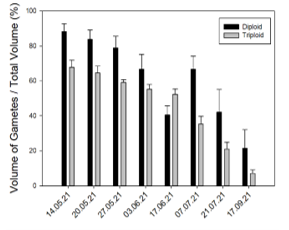TRIPLOID MUSSELS FOR AQUACULTURE COULD LEAD TO BETTER PRODUCTION YIELD WITH HIGHER SURVIVAL RATE
Mussel farming is an important economic resource for Canada, producing 26 101 tonnes of mussels in 2019 worth more than 43 million Canadian dollars. A major cause of loss of production for mussel farmers originates from the fall-off of mussels during their growth. This phenomenon is particularly important during the reproduction season, as mussels invest most of their energy in the reproduction and have less energy for byssogenesis. This leads to byssal weakening, which can ultimately end with the fall-off of the mussels. Recently, there has been an increasing interest in the development of mussel hatcheries and more specifically on the production of triploid mussels. Indeed, it is known that triploidy often reduces the fertility of bivalves and can even produce sterile bivalves that have more energy to invest in their growth and other vital tissues (e.g. byssus).
In this study, we compared the production and mechanical properties of byssal threads of diploid and triploid mussels in relation to their energy budget and reproductive investment. To determine the effect of triploidy on byssal threads, diploid and triploid mussels were placed in a recirculating flume to induce production of byssal threads, then their scope for growth were estimated. The threads were counted and collected for tensile testing. Results show that triploid mussels produced up to 40% more threads than diploid mussels, with triploid threads eliciting better mechanical properties.
From May to September, during the reproductive season, diploid and triploid mussels were harvested in Georgetown Harbour, Prince Edward Island. Gonadosomatic index (GSI), gonad volume, gonad maturation, and sex ratio were determined for both groups. Results showed that while triploid mussels do invest a part of their energy in reproduction, they had lower GSI and gonad volume than the diploids. Also, for all tested groups, triploid gonads were less mature than those of diploids, and their sex ratio was significantly altered with absence of females in triploids. Furthermore, triploid gonads showed signs of gamete resorption, suggesting that triploid mussels could use their gametes for energetic storage.
This study shows that triploid mussels have lower energetic investment in reproduction and suggests that this energy could be used for a higher byssal production with better performance. Thus the creation and production of triploid mussels are of great interest for mussel farmers as they are less likely to fall-off during production, and have higher energy available after spawning, which could result in increased survival and production.
